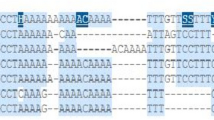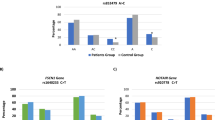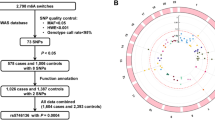Abstract
Esophageal and lung Squamous Cell Carcinoma (SCC) pose a serious threat to health as they are amongst the most prevalent cancers in Pakistan. Increased metabolic and energy needs within the proliferating cancer cells results in hypoxia, affecting the homeostatic balance within the tumor microenvironment. Under these circumstances, key hypoxia-regulated genes like CA9 have major role in the survival and invasiveness of malignant tumors. This study targeted the single nucleotide polymorphism rs2071676 in CA9 to find its association with the risk of ESCC and LSCC. The non-synonymous function of this polymorphism cause the base pair to change from guanine to adenine that changes the amino acid associated with the signal peptide domain of CAIX protein from valine to methionine. Blood samples and data from 127 cases with ESCC, 73 patients with LSCC and from their age and sex-matched healthy controls were collected. Genomic DNA were extracted through standard phenol-chloroform method. Assessment of targeted polymorphism was performed through tetra-primer Amplified Refractory Mutation System Polymerase Chain Reaction (t-ARMS PCR). Pearson’s chi-square value gave statistically significant association of the SNP with LSCC (χ2 = 47.104) and ESCC (χ2 = 87.804), both with p < 0.001. Further augmentation of the results was done by calculating odds ratio, the values for LSCC and ESCC were found to be as 11.814 (Confidence Interval: 5.425–25.727) and 13.64 (Confidence Interval: 7.378–25.221), respectively. Outcomes of this study suggest that rs2071676 may be involved in carrying the risk for LSCC and ESCC, which may bring better insights in genetic diagnostics and prognostics of patients.


Similar content being viewed by others
Data availability
Patients’ blood was drawn and data was collected at the hospital with the permission of the head of oncology department, JPMC. Laboratory work was performed at KIBGE, material was provided by the institute as part of the research work.
Abbreviations
- ESCC:
-
Esophageal Squamous Cell Carcinoma
- LSCC:
-
Lung Squamous Cell Carcinoma
- CA9 :
-
Carbonic Anhydrase Gene
- CAIX:
-
Carbonic Anhydrase Protein
- t-ARMS PCR:
-
tetra-primer Amplified Refractory Mutation System Polymerase Chain Reaction
- DNA:
-
Deoxyribonucleic Acid
- WHO:
-
World Health Organization
- pHi :
-
Intracellular pH
- pHe :
-
Extracellular pH
- HIF-1:
-
Hypoxia Induced Factor-1
- H+ ion:
-
Hydrogen Ion
- GLUT1 :
-
Glucose Transporter 1 Gene
- MCT1/4:
-
Monocarboxylate Transporter 1 and 4
- TME:
-
Tumor Microenvironment
- SNP:
-
Single Nucleotide Polymorphism
- ACD:
-
Acid citrate dextrose
- Tris-EDTA:
-
Ethylenediamine Tetra Acetic Acid
- PCR:
-
Polymerase Chain Reaction
- A:
-
Adenine
- G:
-
Guanine
- MAF:
-
Minor Allelic Frequency
- OSCC:
-
Oral Squamous Cell Carcinoma
- MRCC:
-
Metastatic Renal Cell Carcinoma
- CI:
-
Confidence Interval
References
Adzhubei IA, Schmidt S, Peshkin L, Ramensky VE, Gerasimova A, Bork P, Kondrashov AS, Sunyaev SR (2010) A method and server for predicting damaging missense mutations. Nat Methods 7(4):248–249. https://doi.org/10.1038/nmeth0410-248
Brahimi-Horn MC, Chiche J, Pouysségur J (2007) Hypoxia and cancer. J Mol Med 85(12):1301–1307. https://doi.org/10.1007/s00109-007-0281-3
Brahimi-Horn MC, Bellot G, Pouyssegur J (2011) Hypoxia and energetic tumour metabolism. Curr Opin Genet Dev 21(1):67–72. https://doi.org/10.1016/j.gde.2010.10.006
Bray F, Ferlay J, Soerjomataram I, Siegel RL, Torre LA, Jemal A (2018) Global cancer statistics 2018: GLOBOCAN estimates of incidence and mortality worldwide for 36 cancers in 185 countries. CA Cancer J Clin 68(6):394–424. https://doi.org/10.3322/caac.21492
Bristow RG, Hill RP (2008) Hypoxia and metabolism: hypoxia, DNA repair and genetic instability. Nat Rev Cancer 8(3):180–192. https://doi.org/10.1038/nrc2344
Chiche J, Brahimi-Horn MC, Pouysségur J (2010) Tumour hypoxia induces a metabolic shift causing acidosis: a common feature in cancer. J Cell Mol Med 14(4):771–794. https://doi.org/10.1111/j.1582-4934.2009.00994.x
Chien MH, Yang JS, Chu YH, Lin CH, Wei LH, Yang SF, Lin CW (2012) Impacts of CA9 gene polymorphisms and environmental factors on oral-cancer susceptibility and clinicopathologic characteristics in Taiwan. PLoS One 7(12):e51051–e51062. https://doi.org/10.1371/journal.pone.0051051
Dachs G, Tozer G (2000) Hypoxia modulated gene expression: angiogenesis, metastasis and therapeutic exploitation. Eur J Cancer 36(13):1649–1660. https://doi.org/10.1016/s0959-8049(00)00159-3
Damaghi M, Wojtkowiak JW, Gillies RJ (2013) pH sensing and regulation in cancer. Front Physiol 4(1):370–380. https://doi.org/10.3389/fphys.2013.00370
de Martino M, Klatte T, Seligson DB, LaRochelle J, Shuch B, Caliliw R, Li Z, Kabbinavar FF, Pantuck AJ, Belldegrun AS (2009) CA9 gene: single nucleotide polymorphism predicts metastatic renal cell carcinoma prognosis. J Urol 182(2):728–734. https://doi.org/10.1016/j.juro.2009.03.077
Ferlay J, Colombet M, Soerjomataram I, Mathers C, Parkin D, Piñeros M, Znaor A, Bray F (2019) Estimating the global cancer incidence and mortality in 2018: GLOBOCAN sources and methods. Int J Cancer 144(8):1941–1953. https://doi.org/10.1002/ijc.31937
Fraga A, Ribeiro R, Coelho A, Vizcaíno JR, Coutinho H, Lopes JM, Príncipe P, Lobato C, Lopes C, Medeiros R (2017) Genetic polymorphisms in key hypoxia-regulated downstream molecules and phenotypic correlation in prostate cancer. BMC Urol 17(1):12–22. https://doi.org/10.1186/s12894-017-0201-y
Global Resource for Advancing Cancer Education. (2019). Lung Cancer. https://cancergrace.org/cancer/lung-cancer. Accessed on 31 July 2019
Haapasalo JA, Nordfors KM, Hilvo M, Rantala IJ, Soini Y, Parkkila AK, Pastoreková S, Pastorek J, Parkkila SM, Haapasalo HK (2006) Expression of carbonic anhydrase IX in astrocytic tumors predicts poor prognosis. Clin Cancer Res 12(2):473–477. https://doi.org/10.1158/1078-0432.CCR-05-0848
Hanahan D, Weinberg RA (2011) Hallmarks of cancer: the next generation. Cell 144(5):646–674. https://doi.org/10.1016/j.cell.2011.02.013
Hockel M, Vaupel P (2001) Tumor hypoxia: definitions and current clinical, biologic, and molecular aspects. J Natl Cancer Inst 93(4):266–276. https://doi.org/10.1093/jnci/93.4.266
Ilie M, Mazure NM, Hofman V, Ammadi RE, Ortholan C, Bonnetaud C, Havet K, Venissac N, Mograbi B, Mouroux J, Pouysségur J (2010) High levels of carbonic anhydrase IX in tumour tissue and plasma are biomarkers of poor prognostic in patients with non-small cell lung cancer. Br J Cancer 102(11):1627–1635. https://doi.org/10.1038/sj.bjc.6605690
Klatte T, Rao PN, De Martino M, LaRochelle J, Shuch B, Zomorodian N, Said J, Kabbinavar FF, Belldegrun AS, Pantuck AJ (2009) Cytogenetic profile predicts prognosis of patients with clear cell renal cell carcinoma. J Clin Oncol 27(5):746–753. https://doi.org/10.1200/JCO.2007.15.8345
Lambin P, Leijenaar RT, Deist TM, Peerlings J, De Jong EE, Van Timmeren J Sanduleanu S, Larue RT, Even AJ, Jochems A and van Wijk Y. (2017) Radiomics: the bridge between medical imaging and personalized medicine. Nat Rev Clin Oncol 14(12):749. https://doi.org/10.1038/nrclinonc.2017.141
Lou Y, McDonald PC, Oloumi A, Chia S, Ostlund C, Ahmadi A, Kyle A, auf dem Keller U, Leung S, Huntsman D and Clarke B. (2011) Targeting tumor hypoxia: suppression of breast tumor growth and metastasis by novel carbonic anhydrase IX inhibitors. Cancer Res 71(9):3364–3376. https://doi.org/10.1158/0008-5472.CAN-10-4261
Mahon B, Pinard M, McKenna R (2015) Targeting carbonic anhydrase IX activity and expression. Molecules 20(2):2323–2348. https://doi.org/10.3390/molecules20022323
Malhotra J, Malvezzi M, Negri E, La Vecchia C, Boffetta P (2016) Risk factors for lung cancer worldwide. Eur Respir J 48(3):889–902. https://doi.org/10.1183/13993003.00359-2016
McDonald PC, Winum JY, Supuran CT, Dedhar S (2012) Recent developments in targeting carbonic anhydrase IX for cancer therapeutics. Oncotarget 3(1):84–97. https://doi.org/10.18632/oncotarget.422
McDonald PC, Chafe SC, Dedhar S (2016) Overcoming hypoxia-mediated tumor progression: combinatorial approaches targeting pH regulation, angiogenesis and immune dysfunction. Frontiers in Cell and Developmental Biology 4(1):27–43. https://doi.org/10.3389/fcell.2016.00027
Ondriskova E, Debreova M, Pastorekova S (2015) Tumor-associated carbonic anhydrases IX and XII Carbonic Anhydrases as Biocatalysts, pp. 169-205. Elsevier. https://doi.org/10.1016/B978-0-444-63258-6.00010-X
Opavský R, Pastoreková S, Zelnı́k Vr, Gibadulinová A, Stanbridge EJ, Závada J, . . . Pastorek Jr. (1996). Human/CA9 gene, a novel member of the carbonic anhydrase family: structure and exon to protein domain relationships. Genomics, 33(3), 480–487
Parks SK, Chiche J, Pouyssegur J (2011) pH control mechanisms of tumor survival and growth. J Cell Physiol 226(2):299–308. https://doi.org/10.1002/jcp.22400
Pastorek J, Pastorekova S (2015) Hypoxia-induced carbonic anhydrase IX as a target for cancer therapy: from biology to clinical use. Semin Cancer Biol 31(1):52–64. https://doi.org/10.1016/j.semcancer.2014.08.002
Pfister DG, Johnson DH, Azzoli CG, Sause W, Smith TJ, Baker S Jr, Olak J, Stover D, Strawn JR, Turrisi AT (2004) American Society of Clinical Oncology treatment of unresectable non–small-cell lung cancer guideline: update 2003. J Clin Oncol 22(2):330–353. https://doi.org/10.1200/JCO.2004.09.053
Ping W, Sun W, Zu Y, Chen W, Fu X (2014) Clinicopathological and prognostic significance of hypoxia-inducible factor-1α in esophageal squamous cell carcinoma: a meta-analysis. Tumor Biol 35(5):4401–4409. https://doi.org/10.1007/s13277-013-1579-0
Potter C, Harris AL (2004) Hypoxia inducible carbonic anhydrase IX, marker of tumour: hypoxia, survival pathway and therapy target. Cell Cycle 3(2):159–162. https://doi.org/10.4161/cc.3.2.618
Quail DF, Joyce JA (2013) Microenvironmental regulation of tumor progression and metastasis. Nat Med 19(11):1423–1437. https://doi.org/10.1038/nm.3394
Rademakers SE, Span PN, Kaanders JH, Sweep FC, van der Kogel AJ, Bussink J (2008) Molecular aspects of tumour hypoxia. Mol Oncol 2(1):41–53. https://doi.org/10.1016/j.molonc.2008.03.006
Rofstad EK, Mathiesen B, Kindem K, Galappathi K (2006) Acidic extracellular pH promotes experimental metastasis of human melanoma cells in athymic nude mice. Cancer Res 66(13):6699–6707. https://doi.org/10.1158/0008-5472.CAN-06-0983
Russell DW, Sambrook J (2001) Molecular cloning: a laboratory manual Vol. 1, p. 112. Cold Spring Harbor Laboratory, Cold Spring Harbor, NY
Semenza GL (2014) Oxygen sensing, hypoxia-inducible factors, and disease pathophysiology. Annual Review of Pathology: Mechanisms of Disease 9:47–71. https://doi.org/10.1146/annurev-pathol-012513-104720
Shastry BS (2009) SNPs: impact on gene function and phenotype in Single Nucleotide Polymorphisms, pp. In: 3–22, Humana Press. NJ, Totowa
Shen HP, Hsiao YH, Yang SF, Liu YF, Ko JL, Wang PH (2018) Single nucleotide polymorphisms and haplotypes of carbonic anhydrase 9 can predict invasive squamous cell carcinoma of uterine cervix. Int J Med Sci 15(6):587–594. https://doi.org/10.7150/ijms.23359
Short MW, Burgers KG, Fry VT (2017) Esophageal Cancer. Am Fam Physician 95(1):22–28
Singh S, Lomelino C, Mboge M, Frost S, McKenna R (2018) Cancer drug development of carbonic anhydrase inhibitors beyond the active site. Molecules 23(5):1045–1057. https://doi.org/10.3390/molecules23051045
Swietach P, Hulikova A, Vaughan-Jones R, Harris A (2010) New in- 506 sights into the physiological role of carbonic anhydrase IXin tumour 507 pH regulation. Oncogene 29(50):6509–6521
Thorgeirsson SS, Grisham JW (2002) Molecular pathogenesis of human hepatocellular carcinoma. Nat Genet 31(4):339–346. https://doi.org/10.1038/ng0802-339
Vaupel P, Thews O, Hoeckel M (2001) Treatment resistance of solid tumors. Med Oncol 18(4):243–259. https://doi.org/10.1385/MO:18:4:243
Wang SS, Liu YF, Ou YC, Chen CS, Li JR, Yang SF (2013) Impacts of CA9 gene polymorphisms on urothelial cell carcinoma susceptibility and clinicopathologic characteristics in Taiwan. PLoS One 8(12):e82804–e82810. https://doi.org/10.1371/journal.pone.0082804
Ward C, Langdon SP, Mullen P, Harris AL, Harrison DJ, Supuran CT, Kunkler IH (2013) New strategies for targeting the hypoxic tumour microenvironment in breast cancer. Cancer Treat Rev 39(2):171–179. https://doi.org/10.1016/j.ctrv.2012.08.004
Webb BA, Chimenti M, Jacobson MP, Barber DL (2011) Dysregulated pH: a perfect storm for cancer progression. Nat Rev Cancer 11(9):671–677. https://doi.org/10.1038/nrc3110
Wilson WR, Hay MP (2011) Targeting hypoxia in cancer therapy. Nat Rev Cancer 11(6):393–410. https://doi.org/10.1038/nrc3064
Ye S, Dhillon S, Ke X, Collins AR, Day IN (2001) An efficient procedure for genotyping single nucleotide polymorphisms. Nucleic Acids Research. 29(17), e88-.e88. https://doi.org/10.1093/nar/29.17.e88
Zerbino DR, Achuthan P, Akanni W, Amode MR, Barrell D, Bhai J, Billis K, Cummins C, Gall A, García Girón C, Gil L, Gordon L, Haggerty L, Haskell E, Hourlier T, Izuogu OG, Janacek SH, Juettemann T, To JK, Laird MR, Lavidas I, Liu Z, Loveland JE, Maurel T, McLaren W, Moore B, Mudge J, Murphy DN, Newman V, Nuhn M, Ogeh D, Ong CK, Parker A, Patricio M, Riat HS, Schuilenburg H, Sheppard D, Sparrow H, Taylor K, Thormann A, Vullo A, Walts B, Zadissa A, Frankish A, Hunt SE, Kostadima M, Langridge N, Martin FJ, Muffato M, Perry E, Ruffier M, Staines DM, Trevanion SJ, Aken BL, Cunningham F, Yates A, Flicek P (2018) Ensembl 2018. Nucleic Acids Res 46(1):754–761. https://doi.org/10.1093/nar/gkx1098
Zhang Y (2013) Epidemiology of esophageal cancer. World J Gastroenterol: WJG 19(34):5598–5606. https://doi.org/10.3748/wjg.v19.i34.5598
Funding
No external funding was received for this research work. It was supported by the research institute The Karachi Institute of Biotechnology and Genetic Engineering (KIBGE), University of Karachi, Karachi, Pakistan.
Author information
Authors and Affiliations
Contributions
Saima SALEEM: Study conception and design, providing laboratory work material, literature and manuscript review.
Ramsha KHAN: Sample collection, DNA extraction, primer designing, PCR optimization and research article writing.
Ghulam HAIDER: Hospital IRB approval, providing blood samples and patients’ data.
Sarah HASAN: Sample collection and DNA extraction.
Faria FATIMA: PCR primer optimization and manuscript review.
Sitwat ZEHRA: Result statistical analysis and material approval.
Abid AZHAR: Study approval, guidance and reviewing manuscript.
All authors read and approved the final manuscript.
Corresponding author
Ethics declarations
Approval for the research work and the use of human subjects were obtained as a preliminary step from ethical review committees of the concerned institutes KIBGE and JPMC, respectively. The procedures used in this study adhere to the tenets of the Declaration of Helsinki.
Consent to participate
Written informed consent was taken from all participants included in the study (Cases and Controls) before blood sample collection.
Consent for publication
Supported and approved by the research institute KIBGE, University of Karachi, Karachi.
Declaration of ethical approval and consent to participate
The study was reviewed and approved by Ethical Committee for Scientific Research at The Karachi Institute of Biotechnology and Genetic Engineering (KIBGE), University of Karachi. Written consent for research work was taken from each study participant.
Conflicts of interest/ competing interest
The authors have no competing interests to declare that are relevant to the content of this article.
Additional information
Publisher’s note
Springer Nature remains neutral with regard to jurisdictional claims in published maps and institutional affiliations.
Rights and permissions
About this article
Cite this article
Saleem, S., Khan, R., Haider, G. et al. Association of genetic polymorphism rs2071676 in carbonic anhydrase gene (CA9) with the risk of squamous cell carcinoma of lungs and esophagus. Biologia 76, 2777–2784 (2021). https://doi.org/10.1007/s11756-021-00812-y
Received:
Accepted:
Published:
Issue Date:
DOI: https://doi.org/10.1007/s11756-021-00812-y




